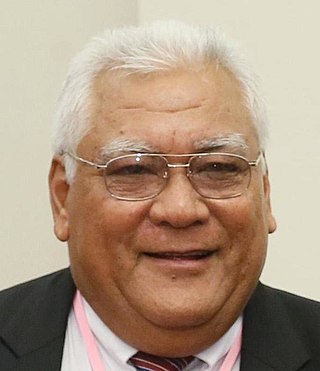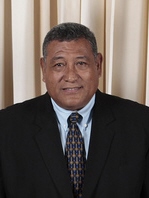Related Research Articles
The politics of Tuvalu takes place in a framework of a parliamentary representative democratic monarchy, whereby the monarch is the head of state, represented by the governor-general, while the prime minister is the head of government. Executive power is exercised by the government.

Maatia Toafa OBE is a Tuvaluan politician, representing Nanumea, who served two non-consecutive terms as Prime Minister of Tuvalu. He first served as prime minister, and foreign minister, from 2004 to 2006, from the resignation of his predecessor, Saufatu Sopoanga, until the defeat of his Cabinet in the 2006 general election. From 2004 to 2006 he also held the role of foreign minister.
Tuvalu elects a legislature on a national level. The Parliament of Tuvalu has 16 members, elected for a four-year term in 8 double-seat constituencies. Tuvalu is a de facto non-partisan democracy since it does not have political parties. The political system is based on personal alliances and loyalties derived from clan and family connections. It does tend to have both a distinct government and a distinct opposition. The 16 members of the current parliament are elected from eight two-seat constituencies via plurality block voting.

The Parliament of Tuvalu is the unicameral national legislature of Tuvalu. The place at which the parliament sits is called the Vaiaku maneapa. The maneapa on each island is an open meeting place where the chiefs and elders deliberate and make decisions.

Sir Kamuta Latasi is a political figure from the Pacific nation of Tuvalu from Funafuti atoll. He was elected to the Parliament of Tuvalu in 1992. Latasi served as the 4th prime minister, and foreign minister, from 1993 until 1996. He has served as the Speaker of parliament from 2006 to September 2010 and again from December 2010 to March 2014.

Apisai Ielemia was a Tuvaluan politician. He served as the tenth Prime Minister of Tuvalu from 2006 to 2010, and also held the role as Foreign Minister. He was returned as a member of parliament in the 2010 Tuvaluan general election. He was re-elected to parliament in the 2015 Tuvaluan general election. On 5 October 2016 Chief Justice Sweeney of the High Court of Tuvalu declared that Ielemia’s parliamentary seat was vacant as he was not qualified to be a member of parliament, as the consequence of the short time the opposition MP served time in jail following his conviction on 6 May 2016 in the Magistrate’s Court of charges of abuse of office during the final year of his term as prime minister. The abuse of office charges related to payments deposited into a National Bank of Tuvalu personal account. The 5 October 2016 decision of the Chief Justice was controversial as it appeared to contradict the June 2016 decision of Justice Norman Franzi of the High Court of Tuvalu that had quashed Ielemia’s conviction and acquitted him of the abuse of office charges. The appeal to the High Court held that the conviction was "manifestly unsafe," with the court quashing the 12-month jail term.
General elections were held in Tuvalu on 3 August 2006 to elect fifteen members to the Parliament. There were 5,765 eligible voters on the electoral roll. 32 candidates, including 2 women, competed for the 15 seats. All fifteen candidates elected were Independents, as there are no political parties in the country.

Willy Telavi is a Tuvaluan politician who was Prime Minister of Tuvalu from 2010 to 2013.
Taukelina Finikaso is a political figure from the Pacific nation of Tuvalu. At the 2006 general election, he was elected MP for his home constituency of Vaitupu. He was educated in Kiribati and Fiji before acquiring a Law Degree at the University of Tasmania and a master's degree in International Law from Sydney University. Finikaso was admitted on 16 October 1987 to the Supreme Court of the Australian Capital Territory. Prior to entering into politics, Finikaso worked as a lawyer and then as a Permanent Secretary under the different ministries of the Government. Finikaso has been a Member of Parliament for the Constituency of Vaitupu from 2006 to 2019. He was not re-elected in the 2019 general election.
Parliamentary elections were held in Tuvalu on 16 September 2010. Voters elected fifteen members of the Parliament to a four-year term. All candidates were independents, as there are no political parties in the country. Ten out of the fifteen incumbent members were re-elected. The remaining five incumbents, including Deputy Prime Minister Tavau Teii, did not retain their seats. The incumbent Prime Minister, Apisai Ielemia, retained his seat in Vaitupu constituency. On 29 September, Maatia Toafa from Nanumea won eight of the fifteen votes to become Prime Minister.

Enele Sosene Sopoaga PC is a Tuvaluan diplomat and politician who was Prime Minister of Tuvalu from 2013 to 2019.
The Cabinet of Tuvalu is the executive branch of the government of Tuvalu.
Dr. Falesa Pitoi is a Tuvaluan politician.
A by-election was held in the Nukufetau constituency in Tuvalu on 28 June 2013. It followed the death of MP and Minister for Finance Lotoala Metia, who died suddenly on 21 December 2012.

The Tuvaluan constitutional crisis was a political dispute in Tuvalu between the government, led by Prime Minister Willy Telavi, and the opposition, led by Enele Sopoaga, that was precipitated by the death of the Minister of Finance, Lotoala Metia MP on 21 December 2012, which eliminated the government's majority. The dispute was eventually resolved in August 2013 by a motion of no confidence in Prime Minister Willy Telavi, following which Enele Sopoaga was elected Prime Minister.

The Telavi Ministry was the 13th ministry of the Government of Tuvalu, led by Prime Minister Willy Telavi. It succeeded the Second Toafa Ministry upon its swearing in by Governor-General Iakoba Italeli on 24 December 2010 after a vote of no confidence in former Prime Minister Maatia Toafa. Following Telavi's removal as prime minister, his ministry was subsequently brought down by the opposition's vote of no confidence and was succeeded by the Sopoaga Ministry, led by Enele Sopoaga, on 5 August 2013.

The Ielemia Ministry was the 11th ministry of the Government of Tuvalu, led by Prime Minister Apisai Ielemia. It succeeded the First Toafa Ministry following the 2006 election, but was voted out of office after the 2010 election and was succeeded by the Second Toafa Ministry, led by Maatia Toafa.
The Constitution of Tuvalu states that it is “the supreme law of Tuvalu” and that “all other laws shall be interpreted and applied subject to this Constitution”; it sets out the Principles of the Bill of Rights and the Protection of the Fundamental Rights and Freedoms.
References
- 1 2 3 "Tuvalu Minister dies in Suva" Archived 26 September 2013 at the Wayback Machine , Islands Business , 24 December 2012
- ↑ "South Pacific Games 1979 (Fiji)", RSSSF
- ↑ "Election Results Bring Changes" Archived 19 October 2008 at the Wayback Machine , Tuvalu News, 3 August 2006
- ↑ "Tuvalu-news.tv". Apisai Ielemia New Prime Minister. 16 August 2006. Archived from the original on 1 March 2013. Retrieved 9 March 2013.
- ↑ "Current Members (including Ministers and Private Members)". The Parliament of Tuvalu. Archived from the original on 5 March 2013. Retrieved 7 March 2013.
- ↑ "Tuvalu Election Results", Tuvalu News, 16 September 2010
- ↑ "New Tuvalu PM Maatia Toafa names cabinet", ABC Radio Australia, 29 September 2010
- ↑ "Meeting restrictions in Tuvalu to ease political tension". Radio New Zealand International . 14 January 2011. Retrieved 15 October 2011.
- ↑ Tuvalu: Cabinet Archived 28 May 2010 at the Wayback Machine , Central Intelligence Agency
- ↑ Paeniu, Lisepa (2012). "How Can Parliamentary Democracy Function More Effectively In Small Pacific Island Countries Such As Tuvalu And Nauru?" (PDF). JSPL (Paclii.org). Retrieved 7 October 2021.
- ↑ Field, Michael (14 January 2011). "Tiny Pacific state in crisis". Stuff.co.nz . Retrieved 15 October 2011.
- ↑ "Political Crisis in Tuvalu Escalates", Tuvalu News, 13 January 2011
- ↑ "Nukufetau v Metia [2012] TVHC 8; Civil Case 2.2011 (11 July 2012)". PACLII. Retrieved 10 March 2014.
- ↑ Matau, Robert (January 2013). "Another by-election for Tuvalu soon?". Islands Business. Archived from the original on 2 May 2014. Retrieved 11 January 2014.
- ↑ "Political future of Tuvalu’s PM awaits decision of by-election in Nukufetau" Archived 8 February 2013 at the Wayback Machine , Islands Business , 10 January 2013
- ↑ Matau, Robert (June 2013). "Tuvalu's high court orders by-election to be held". Island Business. Archived from the original on 21 September 2013. Retrieved 11 January 2014.
- ↑ "Tuvalu’s Opposition waiting to hear from GG" Archived 8 January 2014 at the Wayback Machine , Islands Business , 1 July 2013